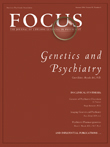Genetics of Psychiatric Disorders: A Primer
Abstract
Genetic etiology plays at least a partial role in most psychiatric disorders. Consistently replicated linkage and association findings of psychiatric disorders are, however, rare. Multiple genetic risk factors are likely to interact with each other and with environmental factors to increase or decrease disease risk. With the introduction of new technologies such as whole genome single nucleotide polymorphism (SNP) chips, a more comprehensive evaluation of genetic risk factors for psychiatric disorders is now possible. Here the author discusses methods used in genetics, including linkage analysis, association studies, linkage disequilibrium, and the new whole genome association studies on SNP chips, which rely on the concept of linkage disequilibrium. The author also discusses the status of genetics specifically related to psychiatric disorders. For this quickly moving field, the emphasis here is to provide the terminology and concepts to help practicing psychiatrists understand the current and future psychiatric genetic literature. The author concludes with an updated glossary of important genetic terms.



